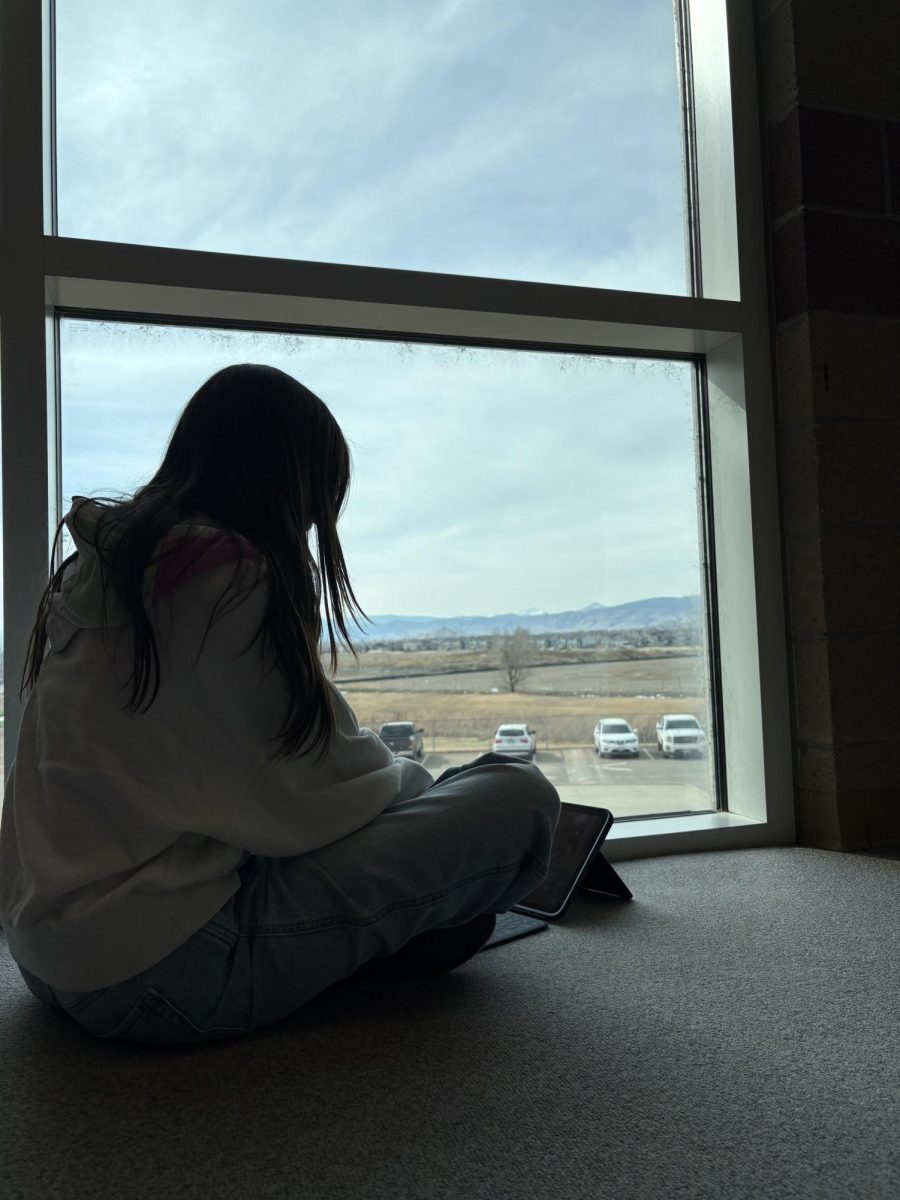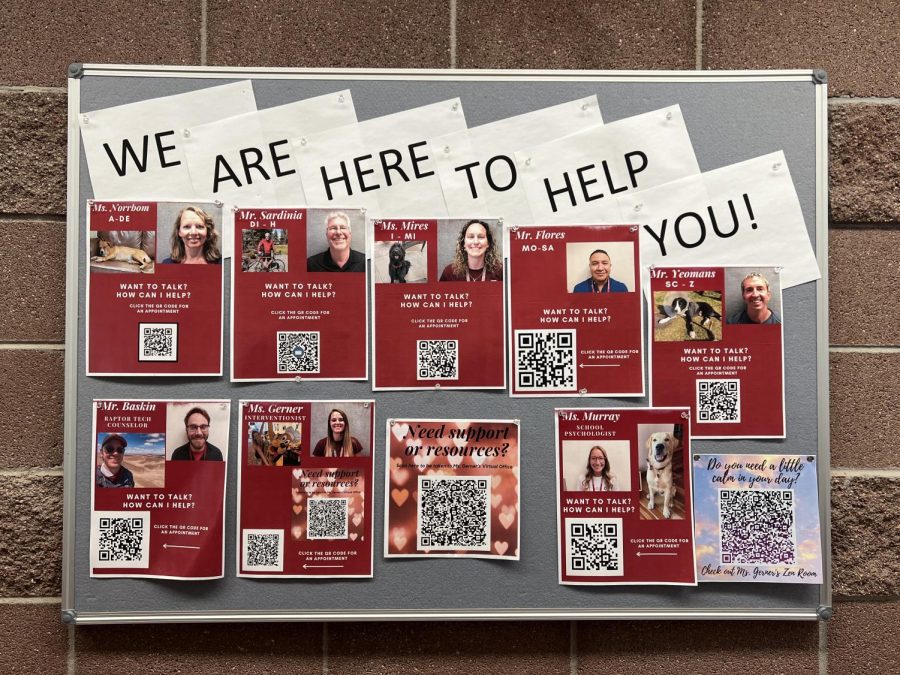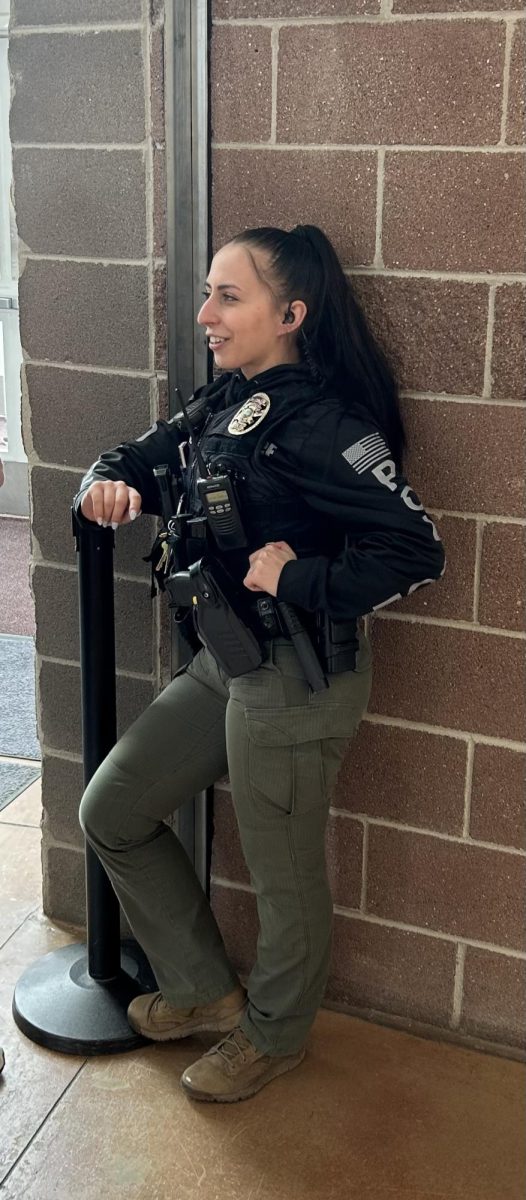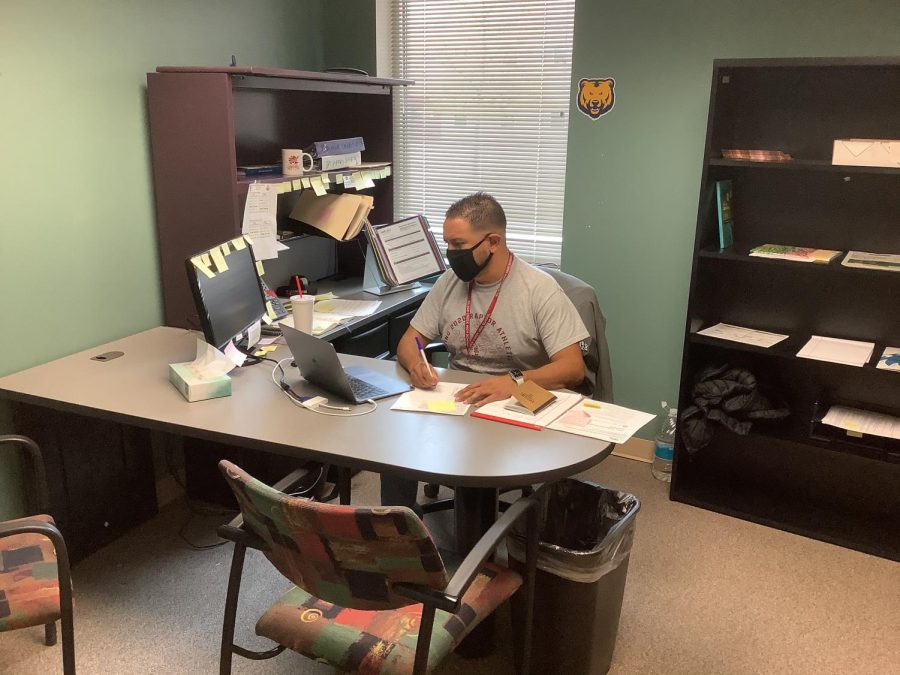OpEd: The School System: A Mental Health Issue
Photo Courtesy of Ollie O’Brien
From Left, Violet Vanderwood, Nora Legg, Hayden Pritchard, and Josh Longenecker sit in the library, a quiet place to work, doing assignments from class.
Disclaimer: Though there are many parts of the school system and how it needs to be changed or updated, this article will focus on the mental health aspect of the system.
Lexington, Massachusetts, 1839. A bunch of men stand in a room, talking about how modern education in the United States should work. They decide this: one teacher will teach 20-30 children math, writing, reading, history, grammar, and geography. They decide that the school day will start early and end late, and children would sit in wood chairs with wood desks, and that’s how it will be.
Now, 2023 in United States public schools, children and teens are required to learn math, language arts, science, and history. The school day starts early, and ends late. One teacher teaches 20-30 children, and the kids sit in hard chairs at hard desks.
One hundred eighty four years go by and the world has changed. The buildings change, the rules change, as does the clothing, transportation, and technology. But for some reason, school practices have remained the same.
In one hundred eighty four years, cars have transformed from horse-drawn carriages, to electric automobiles. In that time, sending letters to people through the mail has evolved into sending text messages on a six inch device a person can hold in their pocket. In that time, music has changed from symphonies, to every different genre somebody’s heart could possibly seek out.
In the past one hundred eighty four years, the way people see certain problems has changed as well. For example: mental health. Mental health has been coming to light rapidly recently, and many people have been coming forward about their mental health. From a 2023 study done by mhanational.org, “11.5% of youth (or over 2.7 million youth) are experiencing severe major depression.”
But has the school system been left unchanged for a reason? Or was it just expected to keep working without change or evolution?
“In general, school can be very stressful for anyone, regardless of how it’s structured,” Ben Hrubesky, a senior at Silver Creek High School, said.
The stress of school often comes from grades, tests, and class busywork, but it can also come from dozens of other things that don’t even involve school directly. Mental health issues are often thought of as: people who are unstable, and will hurt others, according to mentalhealth.org.uk. But mental health issues pose more of a threat to the person who has them, than to the people around them.
Mental health is a fragile thing. It could be affected by an upcoming test, or homework, or issues with family or a friend group. Mental health is affected by an almost incredible amount of things, but it’s often just talked about as: if you’re struggling with thoughts of suicide, go to the mental health interventionist.
“Schools put a lot of pressure on teenagers to be their best, not even be their best for themselves but be their best for statistics,” senior Addy Shevin said. “That’s a big stressor for mental health, especially as you get closer to your senior year.”
For most students, there are often moments where life and school piling up feels like far too much, and teenagers’ mental health is dramatically altered.
“Second semester this year, it’s been a lot,” Shevin expressed. “With my capstone project, and then with finals, and trying to play a sport, and all my classes, it’s rough. And having the looming sense of ‘I’m graduating soon,’ it’s hard, because it feels like nothing matters after you commit to a college.”
Mental health in school isn’t just difficult for seniors though, it’s hard for people in every grade, and it affects people every day in school.
“Last Monday, it wasn’t in school, but I woke up and I was getting ready, and I just had a panic attack because I thought I didn’t turn in any of my journalism stuff,” Jared Dettlebach, a freshman at Silver Creek, said. “I did, but there was so much going on that I felt like I was forgetting something, and it all came crashing down and I felt stressed.”
The amount of school work given in class can often be incredibly overwhelming for students. More often than not, the homework given to students is just something to keep them busy, and usually there is just too much of it.
In addition to this, the entire grading system in school is outdated. It teaches students how to take a test, and not how to show what they learned, if anything. The pressure of grades alone is a huge toll on the mental health of hundreds of students.
“Most of the work we get is just busywork, and I learn some but not a lot,” Shanti Berman, another freshman, said. “When you’re just studying up for a test, you learn all the information, even though you might not care about learning the information, and then it just goes through one ear and out the other after the test.”
“Getting served a bunch of information and being told to take a test on that, and that test is a majority of your grade,” Hrubesky commented, “I don’t think that’s a good way to test how well someone is learning, when really it’s more of a test of how well they’re being taught.”
But what could possibly help this lack of recognition for student’s mental health, and the work overload?
“We only have one [Mental Health Interventionist], and I feel like that’s not enough for the amount of students we have here, and people might think ‘oh, someone else has it harder than me, so I’m not going to take up her time,’” Shevin pointed out.
There’s a kind of shame or guilt surrounding mental health. A lot of students believe that they aren’t worthy of help, because their problems ‘aren’t that big’ and other people ‘have it worse.’ But that shouldn’t be how mental health is looked at. Mental health should be less of a brick wall and more of a window. Someone should be able to look at it clearly. One should be able to open up the window and engage in an actual conversation, and close the window when they don’t want to talk about something.
So much of the stigma around mental health comes from a lack of conversation in school and in classes.
“It’s very discouraged, asking for help,” Berman explained. “I feel like the conversations need to be structured in a more open way. I feel like the ones we have now are kind of like ‘hey you can talk to us any time,’ but there’s not that kind of openness towards the students.”
“It depends on how you do the conversations.” Dettlebach said. “If it’s just some guy addressing an entire class generally about mental health, I don’t think it would really help much. But if teachers work more to get to know their students, get to have individual sessions talking to their students, I think they’d be open, and it’d be a better dynamic.”
Mental health in schools has been mostly overlooked for a very long time. A main problem with the school system is how it treats mental health like it’s a phase, or a minor issue. Supporting students in their school life, from elementary school to college, should be one of the main goals of the system. The world is changing, and it’s easy to see that the school system should too.

Ollie O’Brien is a freshman at Silver Creek High School, and is new to the Journalism course. Ollie decided to take journalism because they thought it...











































![Hosting the SCLA Casptone Mentor Dinner outside allowed for more attendees on September 27, 2021 at Silver Creek. This event would’ve usually been held inside. According to Lauren Kohn, a SCLA 12 teacher, “If we have a higher number of people, as long as we can host the event outside, then that seems to be keeping every[one] safe”.](https://schsnews.org/wp-content/uploads/2021/11/sxMAIGbSYGodZkqmrvTi5YWcJ1ssWA08ApkeMLpp-900x675.jpeg)
















Sarah • May 23, 2023 at 9:39 am
Interesting, I like the quotes you added
Daisy Tiner • May 23, 2023 at 9:29 am
I really like all of the quotes you added, I think they back up your angle a lot.